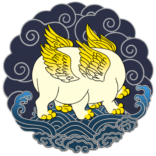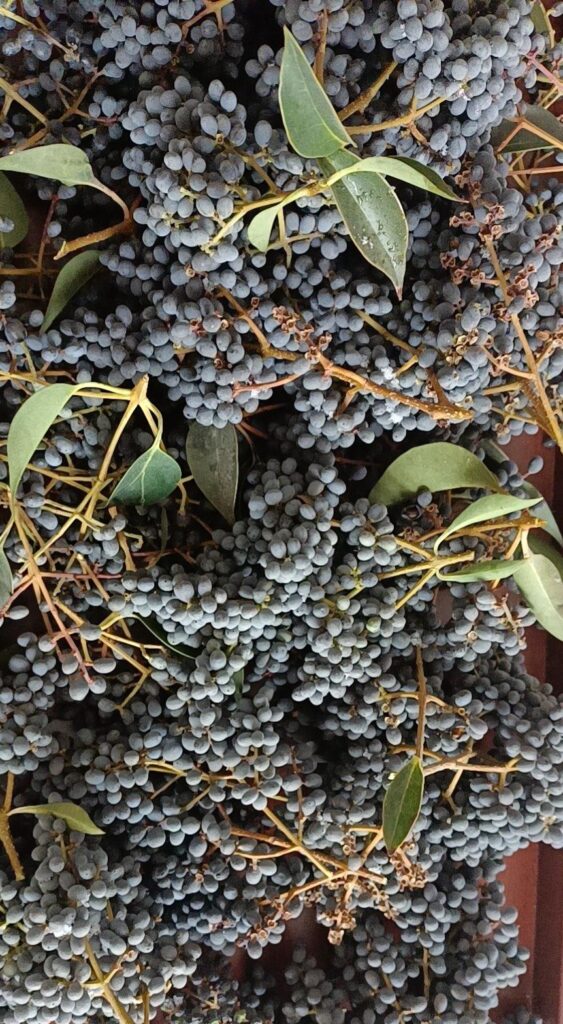女貞子 (Nv Zhen Zi) Ligustrum is a Chinese herb best known for its ability to treat premature hair-graying, hair loss, blurry vision, high-pitched tinnitus, hot flashes, faintness, etc. caused by Liver and Kidney Yin deficiency. It is one of the key herbs of the formula 二至丸 (Er Zhi Wan) “The Double Solstice Pills. ” It is described as a plant whose fruits ripen on the day of Winter Solstice — a time when Yang is initially generated within the Ultimate Yin. The fruits are believed to have the ability to preserve youth and vitality because they don’t wither or fall even in deep winter. They are used to nourish Liver and Kidney Yin, because their bluish-black color demonstrates that they contain the same essence of our Liver and Kidney organ systems.
The widely accepted Chinese medicine textbook 藥典 “Materia Medica” states that, Nv Zhen Zi is cool in quality, sweet and bitter in flavor. It belongs to the Liver and Kidney channels.
The ancient herbal text 神農本草經 “Divine Farmer’s Classic of Materia Medica” states that, Nv Zhen Zi is bitter in flavor, neutral in quality, non-toxic. It governs tonifying the Center (the Middle Burner, or the digestive system), pacifying and calming the Five Zang organs, nourishing the essence and the spirits, removing the hundred diseases. Intaking [nv zhen zi] for a long time thickens and strengthens the body, making the body feel lighter, and supports one’s longevity. [Nv Zhen Zi] grows in the valleys near the water streams.
The Ming Dynasty Chinese herbal text 本草綱目 “The Compendium of Materia Medica” states that, this plant is vibrant green even in the frigid winter, as if a virgin girl guarding her chastity and faith. Hense it is named so.” 女 means female, girl; 貞 means fidelity, chastity; 子 means seeds, berries. The origin of the name provided by “The Compendium of Materia Medica” is in accordance with a folk lore story of this herb:
“In the Qin (221BC) or Han (206BC~220AD) dynasty, there was a low-rank government official living in the Yangzi River region. He had a beautiful and well-cultivated daughter who just turned sixteen years of age — an age for a young lady to get married. This official disregarded his daughter’s intention to marry her true love — the young scholar who was hired to teach her literature and painting, and traded his daughter in exchange for power and wealth. He forced her to marry a high-rank official as his concubine. The day before the wedding day, the young girl committed suicide out of desperation and sorrow. The scholar was utterly heartbroken when he learned about his lover’s death that he fell severely ill, he became bedridden, and his hair turned gray like an old man.
Several years later, on a frigid winter day, the withered young man struggled to get out of bed and walked to the cemetery where the girl was buried. He noticed that there was a beautiful tree growing over her tomb. There were bunches of shiny black berries hanging on the branches. It was unusual for a tree to bear fruit in the winter. He picked a few berries and instinctively put them into his mouth. The berries had a bitter taste with a hint of sweetness. Afterwards, he somehow felt a boost of energy in his body. From that day on, he kept visiting her tomb and eating the berries from that tree. As the time went by, he was surprised to find out that his physical strength recovered, and the gray hair turned dark again. He felt that this beautiful tree was a reincarnation of his lover, who preserved his health and good spirit with her fidelity.”
The characteristic of Ligustrum is that the fruit ripens after Winter Solstice — a time when the Yang begins to rise from underground. It has many important therapeutical qualities beyond the vague description of “tonifying the Liver and the Kidney organ systems.”
To learn more about the functions of Nv Zhen Zi, and the preparation of Ligustrum Powder (女貞子散 Nv Zhen Zi San), please visit my Substack.

